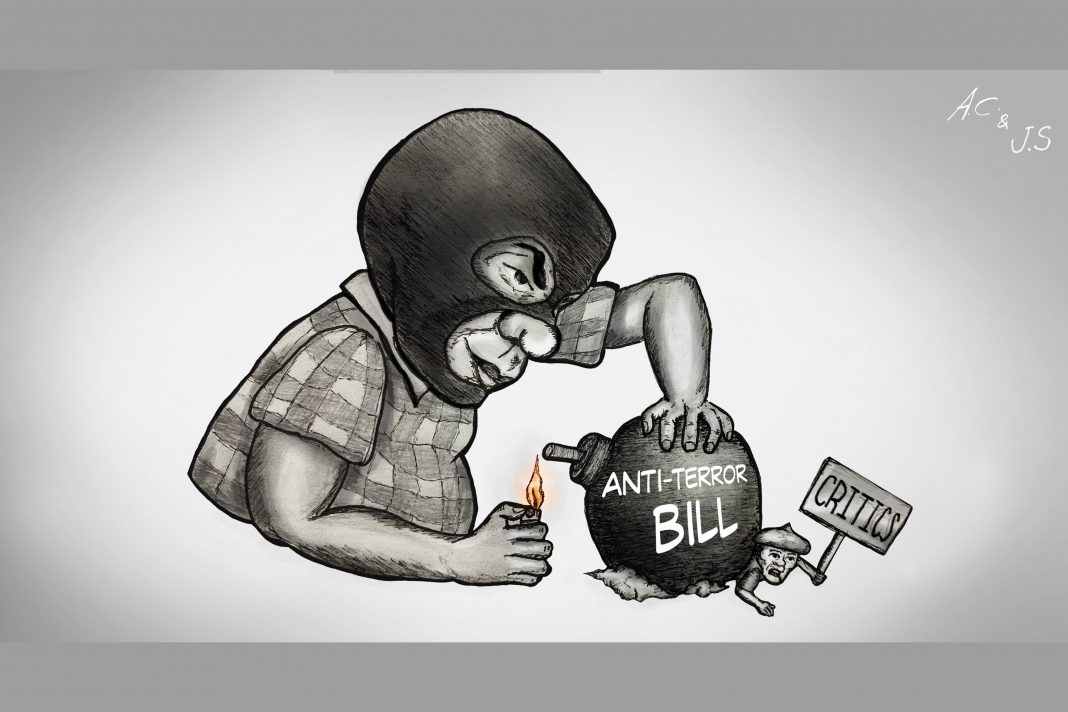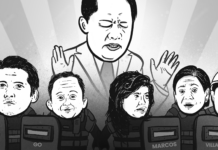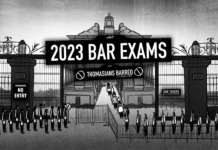THE DUTERTE Congress has railroaded the passage of the Anti-Terrorism Bill so that it is only a matter of time for the douchebag from Davao residing by the filthy waters of the Pasig to sign into law the institutionalization of state terrorism against the people. Vaguely worded and loosely defining terrorism as to encompass just about any act or speech of dissent and disagreement toward an onion-skinned government intolerant of criticism and easily pricked, as evidenced during the lockdown when police enforcers manhandled and even opened fire at violators or when Duterte fumed at critics complaining about his incompetence and arbitrariness, the new law will surely be a further millstone around the neck of the nation.
It is true that terrorism is a serious problem and that it should be checked and eradicated. According to the Database of Worldwide Terrorism Incidents, the Philippines has incurred at least 593 attacks of varying forms from 1969 to 2010. In a span of seven years, Islamic extremists alone have killed over 400 Filipinos, injuring a thousand more.
However, it is also a fact that the bill once enacted could be weaponized and turned against the people it is meant to protect. And make no mistake: in a dictatorial regime like that of Duterte that has successfully labeled, incarcerated and silenced his most vocal critics, that thought is not far from becoming a reality.
The vagueness of the bill should be a cause for concern for every Filipino who cares for democracy and liberty in the country. It gives a shadowy Anti-Terrorism Council (ATC) the authority to arrest people and groups which it designates as “terrorists” without warrant and detain them without charge for up to 24 days. In addition, it also has the power to access private information through wiretapping calls, intercepting emails and text-messages and intruding into private communication. One could be incarcerated for 12 years for “inciting” to terrorism, whatever that means.
With a president who has the habit of branding randomly his enemies as criminals and insurgents through his bizarre matrixes and self-serving red-tagging, we already have an idea where the bill is headed. To be sure, although the bill states that “terrorism shall not include advocacy, protest, dissent, stoppage of work, industrial or mass action, and other similar exercises of civil and political rights,” it in no way guarantees that people who are critical of the government, would not be suspected of destabilizing or “terrorizing” government, especially since Duterte has always shown his aversion to any criticism of his abusive rule and his propensity to tag any opinion contrary to his as “destabilizing.”
In fact, the bill indicates further that the designated persons need not even perform the act of terrorism but merely need to show an intent that is to be determined by the ATC, a super-terrorist body if there was one. Let us have no illusions about it. This bill when enacted would be prone to abuse and arbitrary application that run against the Bill of Rights enshrined in the Constitution.
What do all of these mean? The Anti-Terror bill is nothing but a legal fig leaf for the Duterte government’s campaign of terror against the people.
Especially since the government came into power in 2016, it has been one free fall for human rights in the Philippines. In fact, on the same day that the House of Representatives railroaded the passage of the terror bill, the United Nations Human Rights Office released a country report noting “serious human rights violations,” including killings, arbitrary detentions, and “vilification of dissent.” The report said that since the Duterte government launched its campaign against illegal drugs in 2016, at least 8,663 people had been killed.
And it is not as if the Duterte government with all the intelligence funds at its command has been competent and effective in checking terrorism. In 2017, despite repeated U.S. warnings of activities by Islamic State (IS) elements in Mindanao, Marawi was laid siege and taken over by IS-led Maute militants. The entire Mindanao was put under martial law until Dec. 31, 2019. That’s two and a half years of martial law shouldered by taxpayers. Despite martial law and after, the rehabilitation of Marawi has hardly gotten off the ground.
Last February, the special Senate committee on Marawi rehabilitation chaired by Sen. Ronald “Bato” de la Rosa was still holding a public hearing in Iligan City: MindaNews reported that the meeting started an hour late and lasted two hours, with “39 minutes” spent on introductions of the VIP’s present (Duterte senators Francis Tolentino, Imee Marcos, Christopher Lawrence “Bong” Go, Miguel Zubiri, and of course, “The [Lilliputian] Rock” himself). The meeting ended on a messianic note: the “ultimate solution” is Duterte’s. (“Wala tayong solusyon kundi ‘yung imprimatur galing sa President para matapos na ito,” declared The [Lilliputian] Rock.)
Of course since the hearing ended on a messianic note, it means no salvation would be coming. Marawi remains in ruins. It could be said its rehabilitation has been on permanent lockdown. Meanwhile a US Department of State cable report has warned that the delays in the rehabilitation of Marawi is fueling recruitment of the IS in Mindanao. “Public anger at the Philippine government’s extended delays in providing for the reconstruction of Marawi has allowed extremist elements to regain a foothold in the city,” according to the quarterly report of the lead inspector general for the US Operation Pacific Eagle-Philippines (OPE-P) also last February. “The cable assessed that there is a public perception that politically well-connected government contractors are enriching themselves at the expense of Marawi residents, and this has reinforced extremist anti-government narratives and contributed to terrorist recruitment,” the OPE-P report added.
After ruining Marawi and making a further mess of it through martial law, it appears that the Duterte government through its terrorist Anti-Terror initiative wants to put the entire country under martial law.
It is now evident that the lockdown, the most restrictive in the world but also the most ineffective, has been merely a dress rehearsal for consolidating Duterte’s despotism. It now appears that the real slogan for the “enhanced community quarantine” is not “We heal as one,” but rather, “We heel as one.” The ECQ has been one obedience school for Filipinos to benefit the Mad Pavlov drooling by the Pasig.













